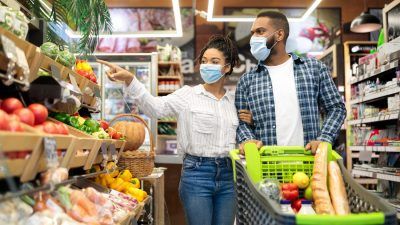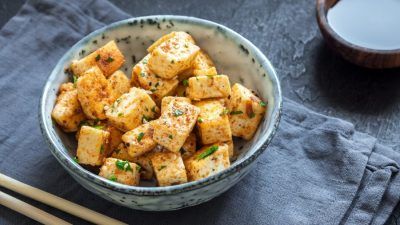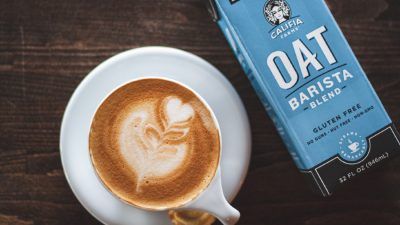10 sources of iron for vegans
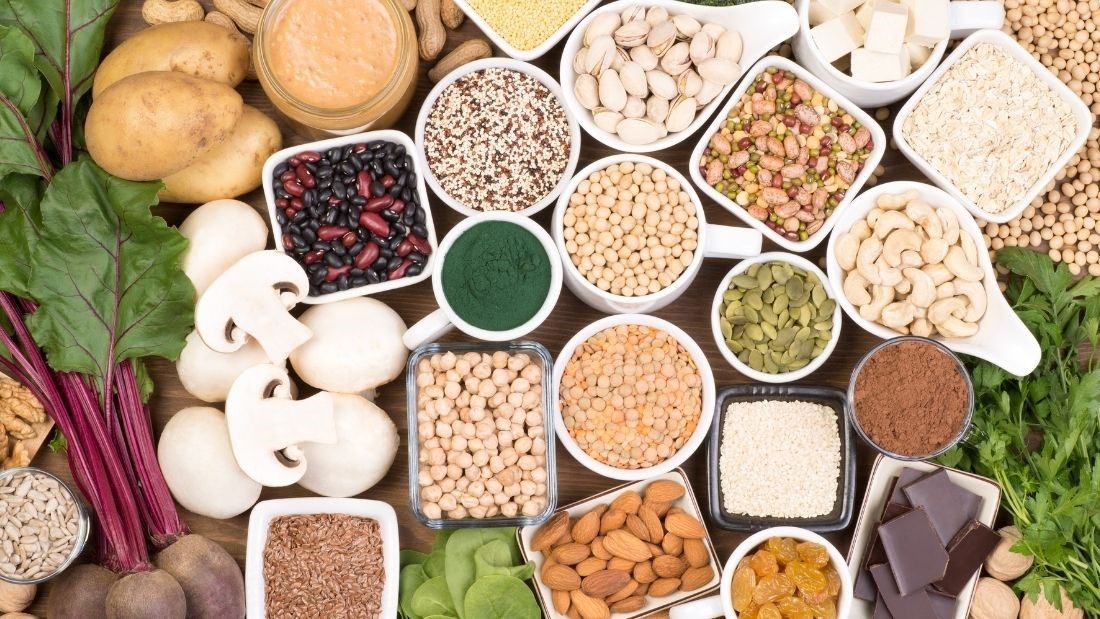
Iron helps transport oxygen around the body and is an important nutrient for vegans and non-vegans alike. Men need around 8.7 milligrams of iron a day while women under 50 have higher requirements, 14.8 milligrams a day, as they lose iron during menstruation. (For more detailed information about requirements, see our chart here.)
Some people might be put off going vegan because they think that without red meat, they wouldn’t get enough iron. However, a well-planned vegan diet can, indeed, give you all the iron you need. What’s more, by obtaining our iron from plant sources, we could actually be reducing our risk of certain diseases.
Iron comes in two forms: haem iron from animal tissue, and non-haem iron from plants. High haem iron intake has been linked to several diseases including heart disease and some cancers. Non-haem iron, on the other hand, has been shown to protect against chronic disease. So, rather than relying on animal sources of iron, we really should be turning to plants. Here are 10 of the best sources of iron for vegans:
1. Blackstrap molasses
Blackstrap molasses are, by far and away, the best source of iron for vegans. One tablespoon provides between 20-25 per cent of our daily requirement. The only downside is that molasses is very high in calories, which is something to bear in mind if you’re trying to lose weight. Luckily, we don’t need much of it to get a good dose of iron. You can use molasses in baking or as a glaze, drizzled on pancakes or make your own Boston baked beans.
2. Lentils
Cooked lentils contain around 4.2 milligrams of iron in every 120 gram serving. That’s about 28 per cent of a woman’s requirement and 48 per cent for men.
Whether red, brown, green, black or yellow, lentils are great sources of protein, complex (healthy) carbohydrates (including fibre), vitamins and minerals. They also contain natural phenolic compounds and carotenoids that are responsible for their colour but are also powerful antioxidants and have anti-inflammatory properties. Brown, black and red colours mean significantly more of these than pale-coloured lentils, such as yellow. These pigments and their health-protective properties have been linked to a lower risk of cardiovascular disease, type 2 diabetes and even cancer. Lentils are great in soups and stews, dahl, or can be used in pasta dishes, such as lentil ragu or Bolognese.
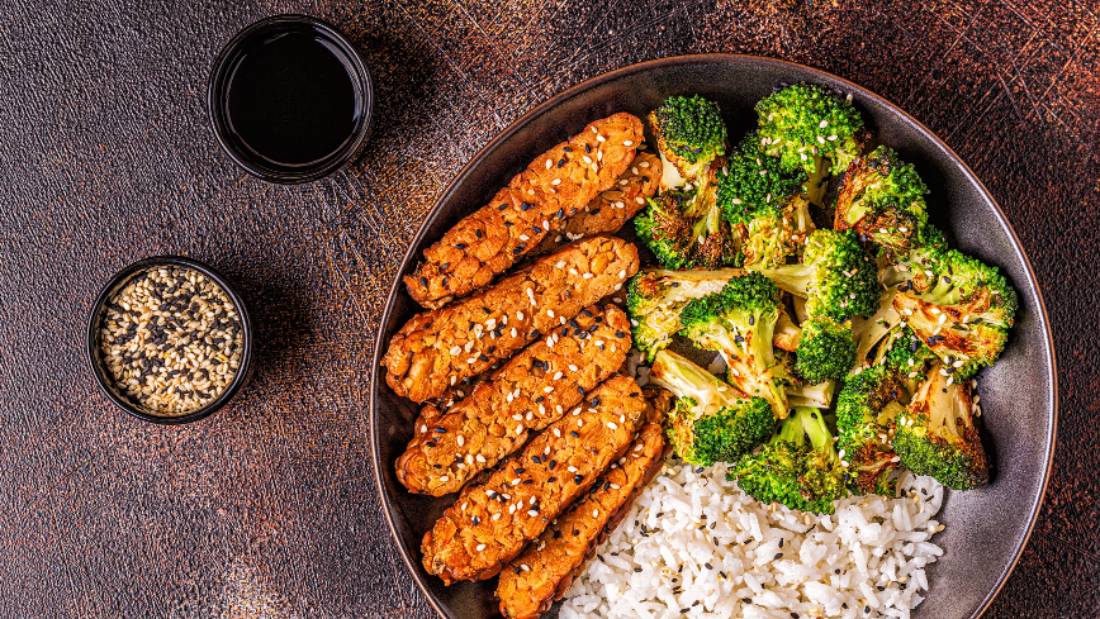
3. Tempeh and tofu
Tempeh and tofu contain 3.6 and 3.5 milligrams of iron per 100 grams, respectively. That’s 24 per cent of a woman’s requirement and 41 per cent for men.
Because tempeh production uses whole soya beans, nothing is left out – all the nutrients from the beans remain in tempeh. That’s why it’s such a good source of protein, healthy fats, carbohydrates, fibre, B vitamins, iron, calcium, magnesium and some other minerals.
The protein in tempeh and tofu is high quality and there’s more of it than in many other plant-based foods with a 100 gram serving containing around 20 grams. Both are great in stir-fries, for breakfast, try tempeh ‘rashers’ and/or scrambled tofu. There are many more tofu and tempeh recipes at the Vegan Recipe Club.
4. Peas
A 100 gram serving of frozen peas (boiled) contains 1.8 milligrams of iron. That’s 12 per cent of a woman’s daily requirement and 21 per cent for men. Chickpeas are also a good source of iron, with cooked chickpeas containing about 2.9 grams of iron per 100 grams.
A cup of peas also contains small amounts of other important minerals, such as calcium, magnesium and zinc. And there’s more – they are an amazing source of B vitamins (except B12), vitamin A, vitamin C and vitamin K. Peas can be served as a side with many dishes or made into pea soup, mushy peas, pea hummus or added to mixed grain ‘bowl’ dishes based on rice or cous cous.
5. Beans
Is there anything the bean can’t do?! Just half a can of baked beans (about 210 grams), contains three milligrams of iron. That’s 20 per cent of a woman’s daily requirement and 34 per cent for men.
Beans are also a great source of protein, complex (healthy) carbohydrates, several B vitamins, vitamin K, calcium, potassium and zinc. Thanks to their protein and complex carbohydrates, they help stabilise blood sugar and because of that are great at preventing and managing type 2 diabetes. Beans on toast is a quick and easy way to get your beans but there are so many more ways – black beans, kidney beans, borlotti, cannellini – they can be used in chillis, to make burgers, in salads, dips, soups and stews and more.
6. Pumpkin seeds
An average 28 gram serving (a small handful) of pumpkin seeds contains about 2.8 milligrams of iron. That’s 19 per cent of a woman’s daily requirement and 32 per cent for men.
Pumpkins seeds are also a great source of zinc and protein and contain an extra dose of vitamin K and magnesium. Pumpkin seeds are bursting with antioxidants such as carotenoids, which have health-protecting properties. And, just like sesame seeds, pumpkin seeds contain lignans which can help to prevent certain types of hormone-sensitive cancers. They are delicious toasted and sprinkled on soups and salads, added to a nut roast or just nibble them along with a few nuts!
7. Cashews
All nuts are good sources of iron but cashews are especially bursting with this important mineral. A 30 gram serving (again, a small handful) contains about two milligrams of iron. That’s about 14 per cent of a woman’s daily requirement and 23 per cent for men.
Some people avoid nuts due to their high fat content – but are all fats equal? Eating even small amounts regularly is associated with some pretty big health benefits, including lower blood cholesterol levels and reduced risk of cardiovascular disease and metabolic syndrome (precursor to diabetes). Cashews are great to nibble on their own, can be added to stir-fries, curries or can be blended to make a creamy addition to sweet or savoury dishes.
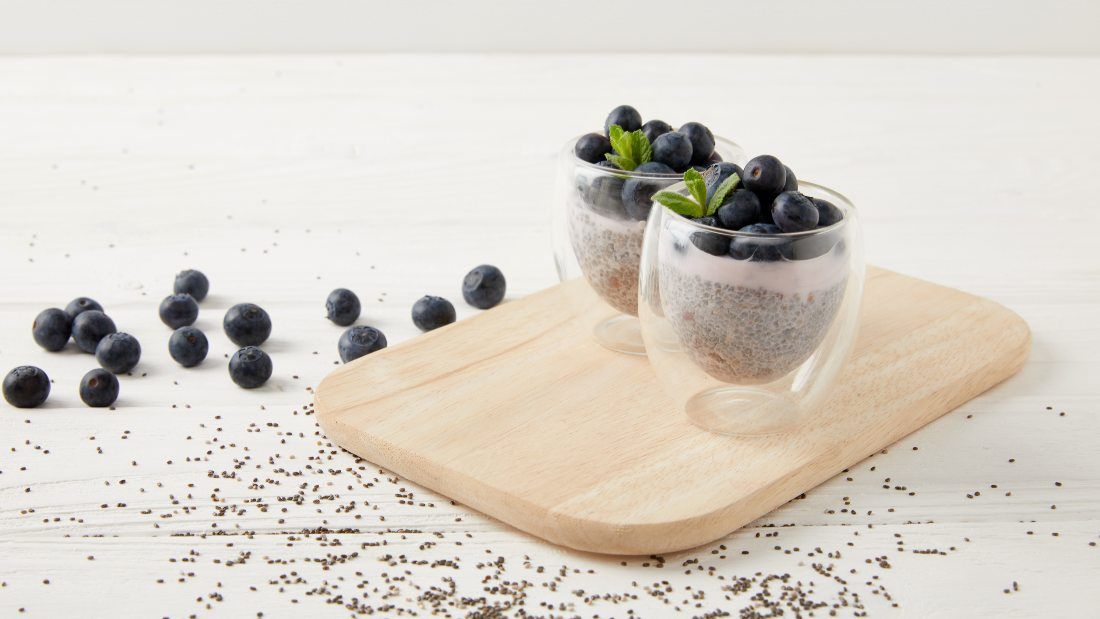
8. Chia seeds
This tiny little seed truly is a nutritional powerhouse – it’s an excellent source of energy, healthy omega-3 fats, protein, fibre, calcium, potassium, magnesium, selenium and iron. A 28 gram serving of chia seeds contains around two milligrams of iron. That’s about 14 per cent of a woman’s daily requirement and 23 per cent for men.
Chia seeds are best eaten soaked (as in a delicious chia pudding) or ground, as otherwise they can pass right through us without leaving us with any of their benefits.
9. Kale
It may be a myth that spinach is high in iron (all because of a misplaced decimal point), but its cousin kale definitely is. A boiled, medium portion of 90 grams contains about 1.8 grams of iron. That’s 12 per cent of a woman’s daily requirement and 21 per cent for men.
Kale belongs among cruciferous vegetables. The reason why these green powerhouses are so highly praised is that all cruciferous vegetables contain very powerful natural compounds that have a strong cancer-fighting effect. The cruciferous family is also a good source of other essential nutrients such as folic acid (folate), vitamins C, E and K and fibre. Kale is very versatile and can be used as a side dish, in soups and stews or added to smoothies. It works very massaged with a little olive oil and added to salads.
10. Quinoa and other wholegrains
A cooked 180 gram portion of quinoa contains about 2.7 grams of iron. That’s 18 per cent of a woman’s daily requirement and 31 per cent for men. Other wholegrains and wholemeal products also contain good amounts of iron. A 220 gram serving of wholemeal spaghetti contains an impressive 3.3 grams of iron. That’s 22 per cent of a woman’s daily requirement and 37 per cent for men.
Making wholegrains your daily go-to option helps to lower your blood fats, including cholesterol. As a result, if you eat two or three servings of wholegrains a day, it may reduce your risk of heart disease by 20 per cent and heart attack by 30 per cent! Wholegrains are also an excellent source of fibre and antioxidants which protect your digestive system. Regular consumption of wholegrains may reduce your risk of bowel cancer by 21 per cent. This may be partly because they provide sustenance for the good bacteria in your gut that help to keep it healthy and but also release some beneficial compounds.
As you can see, if you eat a varied vegan diet, rich in wholefoods, the iron content soon adds up so it’s not difficult to meet all of your iron needs. And these are not the only sources of iron. It can also be found in potatoes, dried apricots and figs, dark chocolate and fortified foods, such as bread and breakfast cereals. Most of these foods are inexpensive and easy to find in any supermarket.
Handy tip!
It’s worth noting that vitamin C increases the amount of iron absorbed considerably by converting it into a soluble, more readily absorbable form so follow up your iron-rich meal with some citrus fruit and strawberries!




